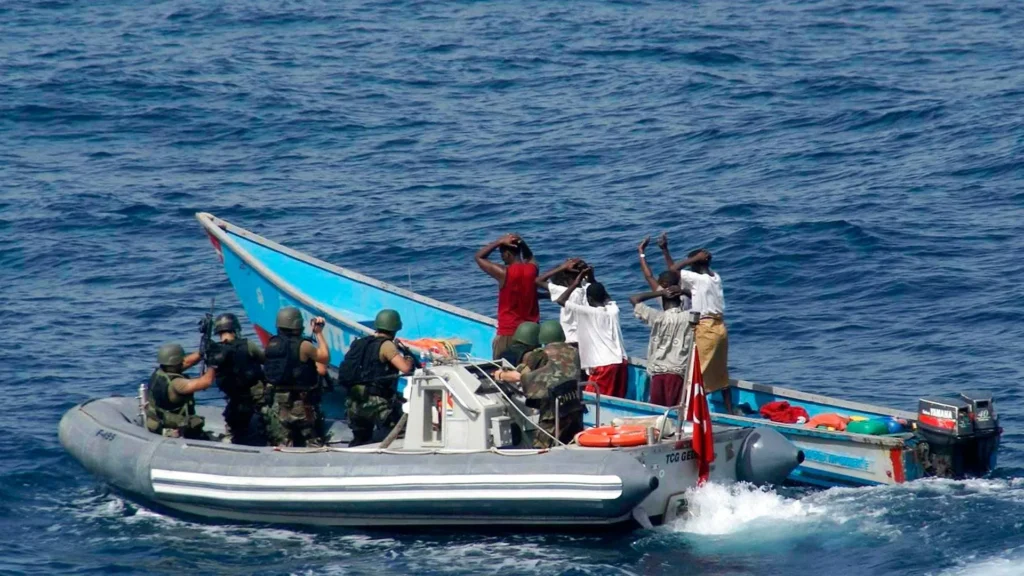An Iranian fishing vessel, Almeraj 1, was reportedly hijacked by Somali pirates in November 2023. According to media reports, the pirates demanded US$400,000 in ransom and threatened to use the Iranian ship for additional hijackings if the payment was not made.
Two days later, other Somali pirates hijacked a tanker, Central Park, off the Yemeni coast. The tanker sent a distress signal during the attack. Forces from a nearby American warship captured the pirates as they tried to flee in a small boat.
-
Sale!
Download Nairobi Law Monthly Magazine July 2024 Edition
Downloads Original price was: KShs200.00.KShs100.00Current price is: KShs100.00.
The two attacks have led the Somali government to call for greater international support to deter a resurgence of piracy in the Horn of Africa. Similar fears that Somali piracy was on the rebound surfaced after five previous attacks in 2017, 2018, 2019 and 2020.
We have been studying the rise and fall of Somali piracy, and have tracked the problem for years. We do not regard a major rise in Somali piracy as likely.
Addressing the threat
Following previous threats, local authorities, experts and organisations tracking piracy globally warned that Somali pirates retained the capacity to launch attacks. This is also the current assessment of the International Maritime Bureau’s Piracy Reporting Centre, which acts to suppress piracy and armed robbery at sea.
The concern is not surprising.
Somali piracy was a major threat to the region and the world economy at its height in 2011. That year alone, Somali pirates carried out 212 attacks. The World Bank estimated that these cost the world economy US$18 billion.
In a recent analysis, we concluded that a range of anti-piracy measures had put a stop to Somali piracy. The measures fall into four main categories:
- anti-piracy naval operations by the world’s most capable navies
- costly self-protection measures, including the use of armed guards, by most flag states and shipping owners
- a legal toolbox enabling pirate prosecution and imprisonment
- capacity-building and the ability to imprison pirates regionally and in Somalia.
Anti-piracy measures
These measures remain largely in place.
Measure 1: The size of anti-piracy naval operations may have shrunk but some international forces remain active. Nato – an intergovernmental military alliance between 29 European and two North American member states – terminated its anti-piracy mission in 2016. However, the European Union retains its mission, as does a US-led coalition. Together they seek to suppress piracy outside the territorial waters of Somalia and other coastal states in the region. In addition, independent deployers like China have warships on patrol.
Measure 2: Most commercial ships sailing through the Gulf of Aden, the Somali basin and the Indian Ocean follow many of the self-protection measuresrecommended by flag states and the main maritime industry organisations. While the number of ships carrying armed guards has dropped considerably, most commercial ships report to the maritime security centres, follow the recommended transit corridor protected by international naval forces and join group transits.
Measure 3: The legal toolbox and the post-trial transfer system making it possible to prosecute pirates and imprison them in Somalia remains in place. This makes jail the most likely destination for the five pirates recently apprehended by US forces following their hijacking of Central Park. Successful prosecution and imprisonment would signal to other pirates that piracy remains an unprofitable undertaking off the Somali coast.
Measure 4: International efforts continue to increase the capacity of Somalia and other regional states to patrol their national waters. The EU’s capacity building mission in Somalia, for instance, still supports Somalia’s maritime security sector. It seeks to strengthen the sector’s capacity to deter, capture and prosecute pirates. The successful operations undertaken by the Puntland Maritime Police Force – including securing the release of hostages – indicate that these efforts are paying off.
These anti-piracy measures continue to be implemented by a broad coalition of state and private actors. They include states from outside the region, regional nations, Somali authorities and the international shipping industry. As long as these actors continue to invest in maintaining these measures, Somali piracy will remain unprofitable.
High risks, few rewards
It remains to be seen if the ransom demand for the Iranian fishing vessel Almeraj 1 will succeed. However, pirates don’t appear to have made any money from any of the other five attacks launched in the 2017-2023 period. We haven’t been able to ascertain if any ransom was paid to secure the release of a Panama-flagged ship captured in August 2020. In the other four instances, the attacks either failed or didn’t result in ransom payments.
Even if the US$400,000 ransom demand succeeds, it doesn’t alter the overall conclusion that piracy off the Somali coast remains a high-risk undertaking with a low probability of success. This suggests that a major increase in Somali piracy is highly unlikely.
If it did happen, though, it would be easy for international naval forces and the shipping industry to reduce the prospects of success by stepping up naval patrols and reintroducing armed guards.
– The Conversation


